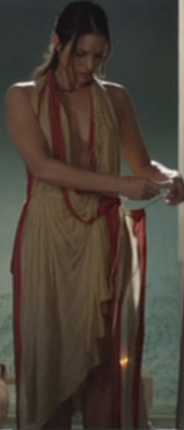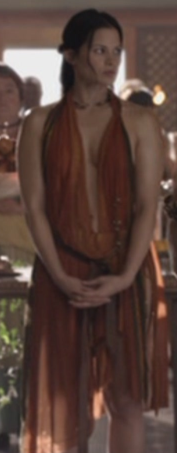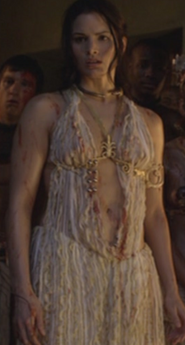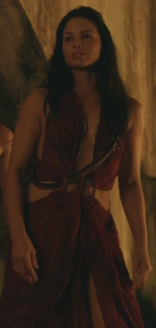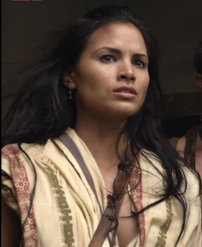| Mira | ||
|---|---|---|
| First appearance | S1E09: Whore S2E01: Fugitivus | |
| Last appearance | S2E10: Wrath of the Gods S3E10: Victory (Flashback) | |
| Profession | Slave (House of Batiatus) Escaped Slave Rebel | |
| Race | Hispanicus | |
| Relationships | Spartacus (Lover/Friend, deceased) Naevia (Friend, deceased) Lucius Caelius (Teacher/Friend, deceased ) Nasir (Friend) Agron (Friend) Donar (Friend, deceased) Aurelia (Friend, deceased) Saxa (Rival/Friend, deceased) Camila (Friend, deceased) Quintus Lentulus Batiatus (Former Dominus, deceased) Lucretia (Former Domina, deceased) | |
| Status | Killed in Battle by Salvius | |
| Actor/Actress | Katrina Law | |
Mira is a major character in the Spartacus series. She is a former house slave serving Lucretia in The House of Batiatus. She helps Spartacus during his uprising, becomes a fighter and later becomes his lover during the beginning stages of Third Servile War.
Appearance
Mira is one of Batiatus' slaves and as such wears the normal rag-like attire of a slave, allowed to wear no jewelry and dressed in only the most minimal of clothing. Throughout most of the first series, Mira wears a tan, draped robe with an orange-red stripe over each breast. She has dark brown hair and brown eyes, with lightly freckled cheeks. Mira is later chosen because of her beauty to try and seduce Spartacus.
Personality
Mira is an obedient slave, but with a fierce personality. Whilst she heeds her masters' wishes without question, her own inner thoughts and emotions leak through around Spartacus. She appears to accept her life of subservience and is unwilling to endanger it. Her actions around Spartacus reveal she harbors some feelings for him but this might only be a craving for affection she has been denied as a slave.
She later finds her voice after escaping the ludus and proves herself a capable leader and fierce fighter. Confidant and strong-willed, she maintains a kind and compassionate disposition around her friends and allies but can also be cold towards her enemies and is willing to do what she has too, even if it means sacrificing something of herself.
Mira develops feelings for Spartacus and desires him to reciprocate them, but knows she cannot fill in the space of his wife Sura.
She shows a darker side when she tries to strangle Ilithyia to death, driven by a jealous rage after learning she is possibly pregnant with Spartacus's child.
Combat Prowess

As a house slave, Mira was never afforded the opportunity to learn how to fight. It isn't until she escapes with Spartacus and the others does she begin to take on the initiative.
Mira's willingness and desire to fight outweigh her actual ability, however, and although she learns basic skills in using a sword, hand to hand combat showing from her fight Saxa and has utilized the ability to fight with a dagger, it isn't until she discovers the bow that her true abilities come to fruition.
With guidance from Lucius Caelius, her marksmanship is deadly in its precision and accuracy, allowing her to truly defend herself and others and take true participation within the rebellion.
Blood & Sand
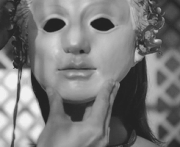
Mira first appears as one of the many house slaves showing off a set of masks to Licinia by Lucretia.[1] Mira wears the mask of the goddess Diana, which catches the eye of Licinia. Following this, Mira and the rest of the slaves are then dismissed.

Lucretia later notices her beauty and realizes Spartacus could use her to "hone his skills" before he beds Licinia, to make sure (as Lucretia says) that the encounter is not over too soon. However, Spartacus rejects her advances after finding her naked in his room, saying he is uninterested and that her presence is an insult. When Lucretia learns of this, she orders Mira to attempt a second encounter, and warns that she will be killed if she fails again.
Mira returns to Spartacus, who yet again refuses her, but this time he allows her to stay in his room to make it seem as if they were together. However, in return for letting her stay, he asks a favor from Mira - she must leave the villa and finds Varro's family. Mira is successful in fulfilling Spartacus' request, leading to a mild feeling of trust between them.
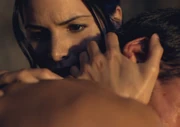
In time, their acquaintance develops into something resembling friendship. She is successful in fulfilling Spartacus' request of finding Varro's wife Aurelia, increasing the friendship between them.
When Spartacus finds her being threatened by Hector under suspicion of her stealing, he fights the guard and injures him. The following night during the celebration of Numerius' birthday, Mira thanks Spartacus for coming to her aid although he feigns indifference, saying he would have done it for anyone, which leads Mira to call him "an ass" much to the amusement of Varro. She watches the sparring bout between Spartacus and Varro and, like everyone else, expects it to be nothing more than a bloodless spectacle. After Varro's death, Mira goes into Spartacus' room to comfort him as he grieves and vents his anger.[2]

Mira is sent to help tend to Spartacus' wounds from his fight with Varro, Batiatus believing there to be affection between the two of them and thus she may be able to help him heal. When Spartacus awakens, he finds a relieved Mira standing over him telling him everything was alright. Spartacus looks around and notices he is laying beside the man who brought his wife back. Burning with the need to know what really happened to his wife, he asks Mira to unstrap him and keep a watch on the door while he interrogates the man. Mira does this obligingly, and after Spartacus has strangled the man to death, she straps him back onto his bed and lies about what caused his death.

When Aurelia, Varro's widow, begins working in the Ludus, Mira watches out for her and helps her adjust to life as a slave, which includes drawing her away from Ashur when he begins making advances on her.
Following Naevia's banishment from the Ludus, Mira and Aurelia are essentially elevated to the status of Lucretia's body slaves.
Mira is called on one night by Spartacus and is sent to his rooms, for what appears to be a visit for sex. Spartacus then reveals to her that, to aid in the slaves' revolt against Batiatus, Mira needs to open the gate separating the ludus from the villa. She agrees, but only if Spartacus will sleep with her and show her some of the love he once felt for his wife, Sura. Spartacus agrees, and the two make love.
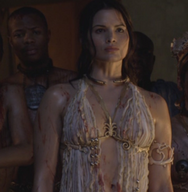
On the day of the revolt, the ludus is having a celebration of Glaber's patronage. Mira slips away while the nobles of Capua watch Spartacus and Crixus fight. She overpowers Linus, the guard at the gate by stabbing him in the neck multiple times with a shard of broken pottery. Her dress is spattered with blood, but she remains unnoticed. When the gladiators revolt, Mira opens the gate to the ludus, allowing the gladiators to pour into the villa and slaughter the Roman guests. After the ordeal, she leaves with Spartacus and the other freed slaves and gladiators.
Vengeance
In the days following the breakout, Mira and Spartacus have entered a relationship. Although she is happy, Spartacus still holds great affection towards his deceased wife, something that causes Mira great pain since he won't truly open up to her.
Mira attempts to convince Spartacus that the Rebels would fare better living out in the mountains as oppossed to the sewers of Capua. He agrees with her which leads her to ask why they remain. Spartacus remains silent to this although Mira is already certain of the answer.
The Rebels soon learn that Gaius Claudius Glaber and an army of Roman soldiers has been sent to kill them all. While the majority agree to leave before it becomes too later, Spartacus believes they are ready to fight something Oenomaus, Crixus and Mira chastise him for. Mira eventually manages to convince Spartacus that they should leave Capua and embark on a mission with Crixus to find Naevia.
The next morning, however, she awakes to find Spartacus gone as he left in order to confront Glaber himself. He is saved at the last moment by Crixus and the other rebels before he is brought back to the sewers. Mira angrily confronted him about what his action, comparing them to that od an angry reckless boy. Spartacus angrily says that he cannot let Glaber live for what he did to him and his wife, but Mira remarks that he needs to focus on something greater, and that all the escaped slaves need him if they are ever going to be free.

The rebels invade a nearby villa and recruits its slaves to their cause. Mira talks to Chadara, whose words caused her to question the depth of her relationship with Spartacus and her meaning to him. After that Mira tended to follow Spartacus on his missions, such as their attack on the Mines where they saved Naevia as she set aside her previous timid nature and adopted a more serious persona. Upon entrance they gave the appearance of latest slave addition to the Mines. Nasir posed as the trader/messenger of a slaver named Ferox. The overseer believed their disguise true and became furious due to two day delay. Nasir proned to state that it was caused by Spartacus and his rebels. Mira presented herself as offering to enter the overseer’s tent and retrieve a map. The fat man became overjoyed and dragged her to the tent. Just as he pulled down her top and dived his face into her exposed breast, she retrieved his knife and pressed towards his private parts. He gave information regarding Naevia’s location and pointed towards the map. Using the distraction he tried to kill her, only to be stabbed by Mira in self defence. When they find and free Naevia, they are pursued by Marcus and his forces during which Mira kills a soldier, proving herself a capable fighter. As the chase goes on, many rebels are killed and Nasir was wounded, Spartacus started blaming himself but Mira reassured him bty sating his actions meant they were now free. When they battle Marcus, Mira attempts to help Spartacus but is knocked down but Spartacus came to her aid by injuring Marcus and killing the soldiers. The next day as they reach Vesuvius, the group spots several figures approaching them and Spartacus told Mira to take the others and run but she refuses, wanting to stay by his side. They prepare for battle, but it turns out to be Agron and the other rebels.

The rebels set up base in the Vesuvius Temple where they meet a Roman hermit, Lucius Caelius, who has turned against his people for harming him years ago. Through him, they learn of Crixus' survival and impending execution at the Arena, which causes Spartacus to launch a plan of rescue. Mira joins Spartacus in traveling the Arena while Agron and Spartacus disguise themselves to free Crixus and the others. Mira's group are tasked with destroying the Arena to cause a distraction for Spartacus to do his mission. Mira's group are successful and the Arena's comes down killing many romans while Spartacus frees Crixus and Oenomaus in the process.
After the fall of the Arena, the rebels start to formulate plans and defenses to prepare for the impending battle with Glaber and his forces. Under the guidance of Lucius Caelius, whom she befriends, Mira was taught to use a bow and arrow, becoming very proficient. During Spartacus and Gannicus' fight, she desires to stop it but is told they should honor the duel. As the battle went on, she notices Chadara try to slip away before picking up the bow and alerts Spartacus, before firing an arrow which unintentionally shoots down Chadara, she reveals that Chadara nearly betrayed the rebels and framed Gannicus.
Although she and Spartacus have a growing relationship, Mira still worries that he will always love his wife Sura more than her. Their relationship comes under pressure when Gannicus arrives at the camp with Ilithyia held captive. Spartacus seems hesitant to kill Glaber's wife, especially when she reveals that the child she carries is his. Mira, on the other hand, would not see Spartacus kill his own child, or at least a child that's claimed to be his, and so attempts to strangle Ilithyia herself. Spartacus stops her, however, and Ilithyia is later released into the woods when Glaber makes it clear

that whatever happens to his wife is of no consequence - he even invites Spartacus to kill Ilithyia.
In the days following Ilithyia release, Mira notices a difference in Spartacus; he no longer sleeps beside her and he only speaks to her to give commands. Spartacus lets it slip that the relationship is over because Mira tried to kill Ilithyia for the wrong reasons, but Mira says she only wished for more of his heart. Spartacus replies that he gave her what was left of his heart. She says it wasn't enough, to which Spartacus agrees.
In order to unite the Rebels, Spartacus devises a plan, having Agron attack a cart full of wine so that the men and women may feast and enjoy themselves. The plan works, pairing people who dislike each other on the same team seems to bring them closer. Mira is paired with Saxa and the two work together to defeat their opponents. They joyously celebrate their triumph, and Saxa even kisses Mira in gratitude.
Meanwhile, Ashur has uncovered the location of Spartacus' hideout, and relays the information to Glaber. He attacks with a large army, sending Spartacus and the remaining Rebels climb Mt. Vesuvius, a barren, cold peak with an advantage only in its height. When some of the Germans become restless, a few make a brash attempt to get through the Romans, only to be rescued by Spartacus, Mira, Gannicus and a few others.
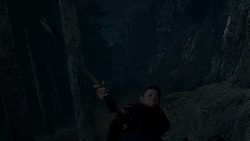
Unfortunately, Mira is caught by Salvius' axe, which was intended for Spartacus. She dies after Spartacus reached the top of the mountain. Because they are on a mountain where digging a grave is not practical, Spartacus prepares Mira's body by wrapping it in cloth and vines. The weaving of vines to form a type of casket gives Spartacus the idea of weaving vines into ropes that would allow a small number of Rebels to repel down a side of the mountain that was not well protected by the Romans. It is Mira's death that
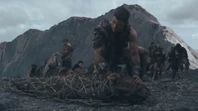
ultimately inspires the Rebels to leave the mountain and defeat the Romans. She was finally avenged when Spartacus kills Salvius and Glaber.
War of the Damned
After Crixus' death, a pyre was lit in honor of him. Mira was honored by Spartacus, as well as Sura and Varro, when the Rebels were honoring their fallen loved ones.
During his final fight with Crassus, Spartacus has flashbacks of the deaths of Mira, Varro and Sura, which inspired him to keep fighting.
List of Appearances
Spartacus: Blood and Sand
- 109: Whore
- 110: Party Favors
- 111: Old Wounds
- 112: Revelations
- 113: Kill Them All
Spartacus: Vengeance
- 201: Fugitivus
- 202: A Place In This World
- 203: The Greater Good
- 204: Empty Hands
- 205: Libertus
- 206: Chosen Path
- 207: Sacramentum
- 208: Balance
- 209: Monsters
- 210: Wrath of the Gods
Spartacus: War of the Damned
- 310: Victory (Flashback)
Killed Victims
- Linus – Stabbed by the back. (Kill Them All)
- Roman Soldier – Stabbed multiple times. (A Place In This World)
- The Procurator – Stabbed multiple times. (The Greater Good)
- Roman Soldier – Stabbed multiple times. (Empty Hands)
- 2 Roman Soldiers – Burned down. (Libertus)
- Hundreds of roman civilians- Burned in the destruction of the arena. (Libertus)
- Chadara – Accidentally shot in the neck with an arrow. (Chosen Path)
- Octavius Tarsus – Stabbed with an arrow. (Balance)
- 4 of Varinius Soldiers. In combat. (Monsters)
- Glaber's Soldiers. Skirmish on Vesuvius. (Wrath of the Gods)
Trivia
- The scene introducing Mira to Spartacus bears striking similarity to the introduction of Spartacus and Varinia in Stanley Kubrik's film, causing many fans to initially speculate that Mira might become Spartacus' second wife in future episodes. That speculation was proven partially true in season 2.
- Mira appears also in Spartacus: Vengeance The Game.

- It was revealed by the creators that she was intended to survive the Battle of Vesuvius, and that she would have likely become Gannicus's new lover. However, this was changed in the writing of the last episode.
- Among Spartacus's lovers, she is the only one he technically breaks up with before his death or theirs.
- She is also arguably the most affected by him, as she used to be content with her life of subservience until her feelings for Spartacus compels her to support his plan for revenge and joins his rebellion. Her desire for his love also drives her into murderous jealousy when she learns Ilithyia is possibly pregnant with his child.
- Mira was the eighth main character to be killed.
- If Mira comes from Hispania, her origins may be either Celtiberian (Guadalajara Province, Soria Province and Castile-La Mancha in central Spain), or from the lands of the Lusitani tribal confederation (Portugal and western Spain).
- The Latin term for a female slave is Ancilla (hand-maiden).
- The literal Latin rendering of a female body slave is Serva Corporis.
- The Latin word for archer is Sagittarius. Mira learned archery from the Roman exile Lucius Caelius.
- The name Mira is Latin, meaning "wonder".
Quotes
- Mira (To Spartacus, referring to Hector's advances): "Gratitude for last night."
- Spartacus: "The man overstepped. I merely made correction."
- Mira: "Still... the heart swells at such kindness.
- Spartacus: "Then see it deflate. I would have done the same for any woman."
- Mira: "You are an ass."[1]
- Mira: "Was she such a woman? Your wife?"
- Spartacus: "She was the sun. Never to rise again."
- Mira: "A heavy thing, to be denied its warmth. I will see the gate opened, but I would have exchange. This is my price: to feel you inside me, to know a pale shadow of the love you felt for her."
- Mira (referring to Gannicus): "Did he miss the part where we pulled the arena down on his head?"
- Mira (referring to Gannicus): "He is right. We were mistaken - to have placed faith in his intentions."
- Spartacus: "...perhaps Gannicus can be swayed."
- Mira: "Or perhaps you should have killed him...in the arena."
- Mira: "You seek Donar's affections now?"
- Chadara: "I seek only my place in this world"
- Mira: "Then seize it with your own hands, not with the spreading of your legs."
- Mira: "You will find a way to see us from this. You always do."
- Spartacus: "As you always find words to pull me from darkest thoughts."
- Mira: "A talent I pray your next woman holds." (Last words to Spartacus before her death.)


